Tooltester is supported by readers like yourself. We may earn an affiliate commission when you purchase through our links, which enables us to offer our research for free.
Let’s go back in time: It’s the 1950s, and you’re debating whether you need to run a physical storefront on the main street or continue operating your business from your garage.
Fast-forward to today, deciding whether to build a website can pose a similar dilemma for modern entrepreneurs. However, compared to setting up a shop on a busy street in the fifties, setting up a small business website is much easier and less expensive. All thanks to easy-to-use website builders.
But with so many options to choose from on the market, which one is the best website builder for a small business such as yours? That’s what we’re going to find out.
What Kind of Website Builder Does My Small Business Need?
Thanks to website builders, you no longer have to be a code master or outsource to someone who can build your website. Web builders fall into two categories: drag-and-drop and Content Management Systems (CMS). Your budget, time requirement, and level of website customization determine which one works best for you.
| Drag and drop builder | Content Management System | |
|---|---|---|
| Type of website | Simple | Complex |
| Number of pages | 1 – 20 | 1 – 100 |
| Templates | Ready-made. Limited customization options | Ready-made. Full customization available |
| Time frame to completion | 3 – 7 days | Several weeks or even months |
| Budget (rough estimate) | $7.50 to $15 per month | $800 to $1,500 if you hire someone to do it. Plus $6 to $25 per month for ongoing hosting and maintenance costs |
| Hosting | Included (Cloud hosting) | Your own web storage (usually) |
| Services you can use | Wix, Squarespace, GoDaddy, Weebly, Zyro, Jimdo | WordPress (or the hosted version, WordPress.com) |
Drag-and-drop Web Builders
Within this category fall popular website builders such as Wix, Squarespace, GoDaddy and Weebly. Pre-designed templates are already available, so all you have to do is add your own content (text, images, additional sections) to complete the website.
This type of website builder also lets you do everything in one place–from purchasing a domain name to setting up your professional email. You can usually even access scores of built-in, customizable themes and third-party add-on stores to suit your business needs.
Content Management Systems
If you prefer to personalize every webpage from scratch and not limit your creativity with identical pre-designed templates, a CMS website builder is a more practical option for you. They work best for building complex websites because of the advanced tool kits and the high level of customization available.
They are ideal if you are building a serious website where you want full control of the look and style, the ability to scale over time, and other advanced options like multiple languages.
WordPress is the best-known (and most popular) example of a CMS, although others like Drupal and Joomla also exist. Our own website is built with WordPress, and we chose it because of its ability to handle the huge amount of content we have on our site, its strong blogging capabilities, and its ability to manage additional languages.
Unlike drag-and-drop builders, they require more technical knowledge (read: coding) and skills. But they often come with paid themes and plugins for better design and performance, making them less intimidating than handcoding a new website from scratch.
What To Look For In A Small Business Website Builder
Aside from choosing between these two types of website builders, you have a lot to consider before making your final decision. To come up with our list of the best website builders for small business, we’ve taken into account the following factors:
1. Ease of use
If you’re planning to DIY it, the learning curve should be minimal. Not all small business owners have the technical know-how to create coded websites. The editor and navigation should be intuitive enough for novice users.
2. Choice and Design Flexibility
There should be enough stylish templates and layouts that you can select from. This gives you the ability to create a website tailored to your business–without the need to code. And they need to work well on mobile devices – for that reason you need a mobile-responsive (or at least a mobile-friendly) template.
3. Relevant Features
Some website builders have a variety of tools that can support small businesses – but not all. Whether you own a consultancy firm or a local establishment, your website builder should have built-in capabilities or integrations – such as an appointment booking form or email marketing tool – that can knock your business requirements out of the park for you.
4. Support
If you’re using a website builder for the first time, customer support should be readily available to answer questions and offer tips. There should also be enough online resources for users to explore.
5. Cost-effectiveness
Affordable doesn’t always mean cheap. Ideally, the website builder should be able to provide you with all the essentials at a fair price. No hidden charges creeping in.
With these in mind, we’ve tested a handful of established and new website builders on the market. And we’ve come up with a list of the top website builders for a small business.
The 7 Best Website Builders for Small Business
With a huge range of templates, advanced editor, and hundreds of integrations, Wix remains our all-round champion among the best website builders. In our tests, we found it to be the best platform for providing all the website features a small business would need.

But, depending on your specific needs, you might find there’s another website builder that’s better suited to your small business. Our runners-up are Squarespace, GoDaddy, Zyro, Jimdo, Weebly, and WordPress.com. Each has its own unique strengths, which we’ll dive into shortly.
Here’s how we rated each one, with a score out of 5, in each of these key categories:
| Website builder | Wix | Squarespace | GoDaddy | Zyro | Jimdo | Weebly | WordPress |
|---|---|---|---|---|---|---|---|
| Ease of use | 4.5 | 4 | 5 | 4.5 | 5 | 5 | 3 |
| Choice and Design Flexibility | 5 | 5 | 3 | 4 | 3.5 | 3.5 | 4 |
| Widgets & Apps
(Small Business Features) |
5 | 4 | 3.5 | 3 | 3 | 4.5 | 4.5 |
| Support | 5 | 4 | 4 | 4 | 3.5 | 5 | 4 |
| Overall Rating | 4.5 | 4.3 | 4.1 | 4 | 4 | 3.8 | 3.8 |
Now, let’s take a closer look at the pros and cons of each website builder, and figure out which one is best suited to your business.
1. Wix – The One-Stop-Shop for Creating Small Business Websites
We’re starting strong with our top-ranked website builder for small business: Wix. The reason? It provides a solid foundation for an excellent website. More than that, it also comes with tools to enhance visual elements and functionality in the best way possible for your business.
Because Wix pretty much has it all (and then some), it’s never difficult to recommend it as a website builder. You can choose from 800 templates spanning a huge range of different industries, which you can customize by dragging and dropping design elements using Wix’s intuitive editor.
If nothing suits your fancy, Wix Artificial Design Intelligence (Wix ADI) can whip up a new set of suggestions tailored to your specific business requirements and preferences.
Wix Pros and Cons
Pros:
- Exceptional and diverse templates
- Flexible designs
- Solid app store
- Business-focused features
- User-friendly editing tools (choice of two editors)
Cons:
- Pricier plans than their counterparts
- High learning curve
Wix Small Business Tools
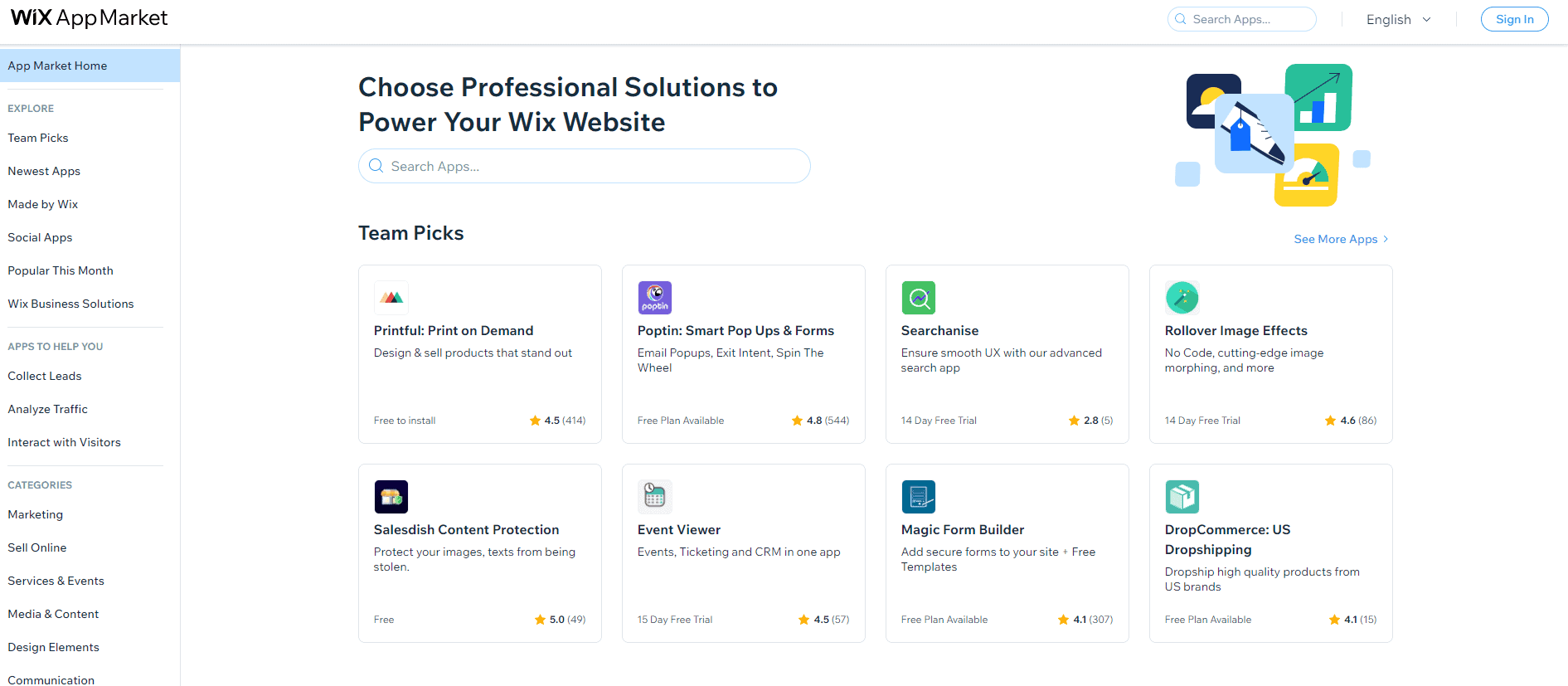
The App market is Wix’s biggest selling point–especially for businesses
Here is where Wix truly shines. A comprehensive app market lets you integrate some of your favorite business tools into the platform. With 250+ apps, you can analyze traffic, handle social media, collect leads, interact with visitors, and so much more.
For example, freelancers can add extra functionality such as photo galleries if they want to display their work. For businesses that want to move key activities online, Wix has built-in tools for taking appointment bookings, managing restaurant reservations, and managing hotel stays.
And for ecommerce entrepreneurs, Wix has three plans that allow you to create an impressive online store, promote your products, and accept payments in different currencies. (Learn more about creating Wix online stores here.)
Which small businesses can benefit from Wix?
Based on the outstanding features they offer, Wix is suitable for all businesses under the sun – restaurants, B&Bs, consultancies, yoga studios, you name it. But it’s not the most affordable of the bunch, so if your budget is restricted, we’d recommend checking out #3 on our list, GoDaddy.
More Information On Wix
Inclusions:
- Free Plan
- Free Domain with Paid Plan
- Free Hosting with Paid Plan
- Mobile App
- Contact form
- Free Email
Support: FAQs, Email, Chat, Telephone
Paid Plans start at: £9 / month
> See why we dubbed it the best website builder for small businesses in our extensive Wix review.
> Try Wix.com today.
2. Squarespace – The Brand Strengthening Champion
Squarespace is known for being sleek. Minimalist logo. Cool, laid-back endorsers (e.g. Zendaya and Keanu Reeves). 140+ versatile, crisp, and modern templates (see some here). It’s no wonder that this website builder commands attention, particularly from the creative crowd. The detail in its design resonates with style-conscious freelancers and entrepreneurs.
Squarespace gives users the ability to upload an image gallery and blog posts with ease, which is why it works so well for portfolios. Nevertheless, ecommerce businesses can also benefit from setting up an online presence with Squarespace. The website builder equips its users with numerous built-in tools for selling and marketing products, services, and even, digital content.
The only downside is that the Squarespace editor is overly minimalistic, obscuring a lot of information. It will take some time before you figure out what certain buttons do.
We can see it slowly changing, though. Updates are rolling out continuously. Their new version introduces pre-built sections and more flexible templates, which could make the editing process easier.
Squarespace Pros and Cons
Pros:
- Professionally-designed templates (possibly the best out there)
- Minimalistic user interface
- Strong branding capabilities
- Suite of helpful tools regardless of what industry you’re in
- Excellent blogging feature for content marketing
Cons:
- Less intuitive editor
- Limited depth of navigation (only one-sub level
- Nearly impossible to set up multilingual websites
Squarespace Small Business Tools
Squarespace prides itself on being an all-in-one small business solution. Not only does it help you build a beautiful website, but it also offers branding support. For example, their free logo maker lets you design a logo that you can automatically use in email campaigns, automated appointment scheduling pages, and even packaging and shipping labels.
Its built-in commerce tools range from display (e.g. product page features) to backend (e.g. inventory management tools). It also offers businesses the ability to add a membership area, library for digital content, and scheduling tools for service-based businesses.
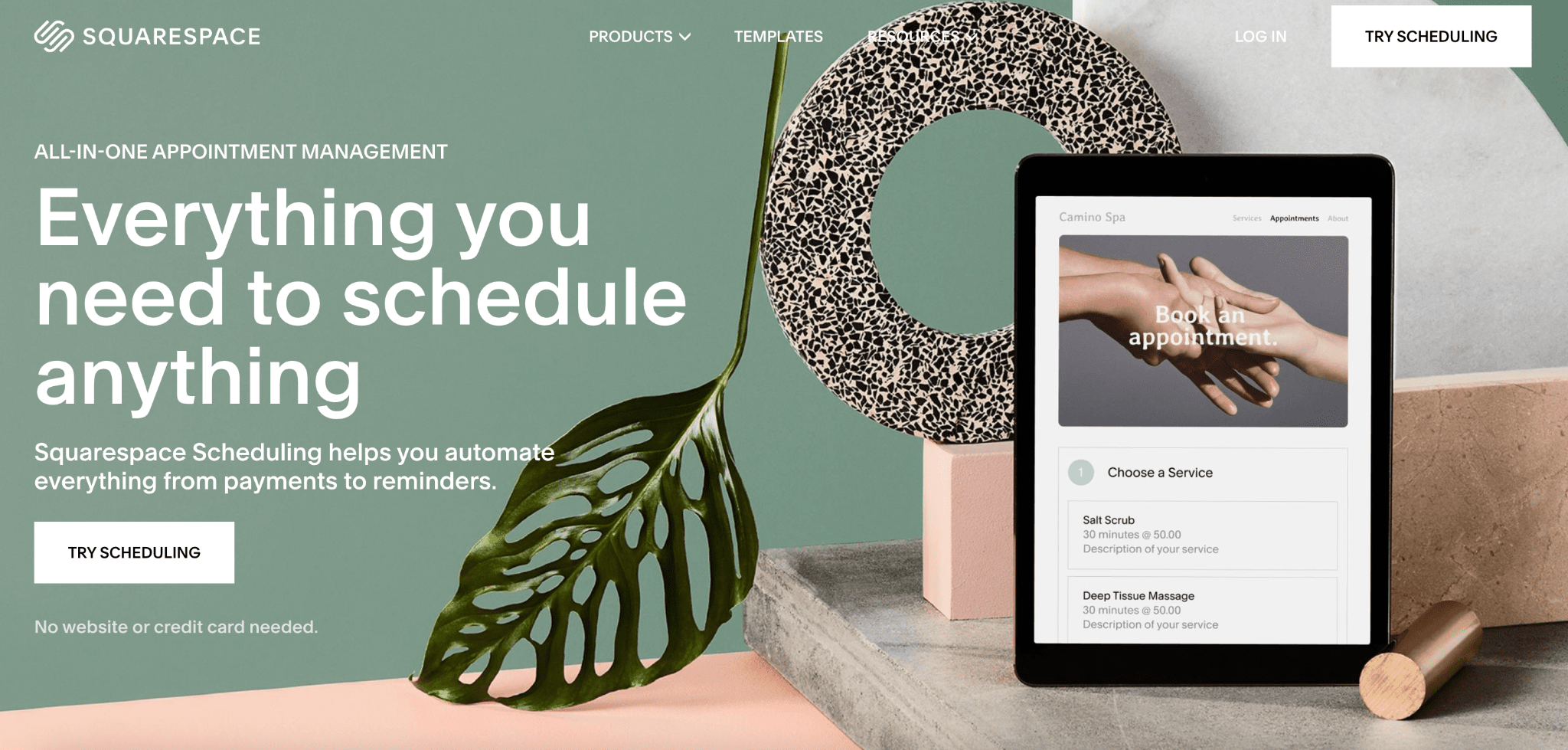
The scheduling tool isn’t just for booking appointments, you can also use it to keep track of your operations
Additionally, there are industry-specific integrations available (e.g. Tock as a reservation system for restaurants), content creation tools (e.g. Unfold, home to beautiful social media templates), and valuable web-based business applications (e.g. Google Workspace, which lets you create a domain-based email account).
Which small businesses can benefit from Squarespace?
Any company that places style and branding on the top of their priority list. Think: Freelancers, independent contractors, course creators, design firms, etc.
More Information On Squarespace
Inclusions:
- Free Domain with Paid Plan
- Free Hosting with Paid Plan
- Mobile App
- Free Email (1st year only)
- Contact form
- Free Plan (only free trial)
Support: FAQs, email, chat
Paid plans start at: £12 / month
> See Squarespace’s pricing plans
> Check out some real small business websites that have been built with Squarespace
> Read more about Squarespace in our review
> You can also try Squarespace for yourself.
3. GoDaddy Website Builder – A Powerful Marketing Partner
GoDaddy’s latest attempt at becoming a leading website builder is looking pretty good so far. (We say latest because they’ve overhauled their website builder several times in recent years – thankfully, it looks like their current one is here to stay.)
With the GoDaddy Website Builder + Marketing platform, you have access to over 100 clean and mobile-responsive design templates, a simple editor, and a central dashboard to manage your site once it’s up and running.
GoDaddy isn’t entirely a drag-and-drop builder. Designing your website involves working with a grid layout. While this inhibits your ability to create ultra-customized webpages, it also means the editor is more user-friendly. GoDaddy also gives users a variety of display options and elements to play with, making it possible for you to build a design close to your vision.
GoDaddy Pros And Cons
Pros:
- Budget-friendly pricing plans
- User-friendly builder
- Rich in marketing and analytics features
- Fast page loading speeds
Cons:
- Simplicity makes it difficult to scale
- No app store means few integrations
GoDaddy Small Business Tools
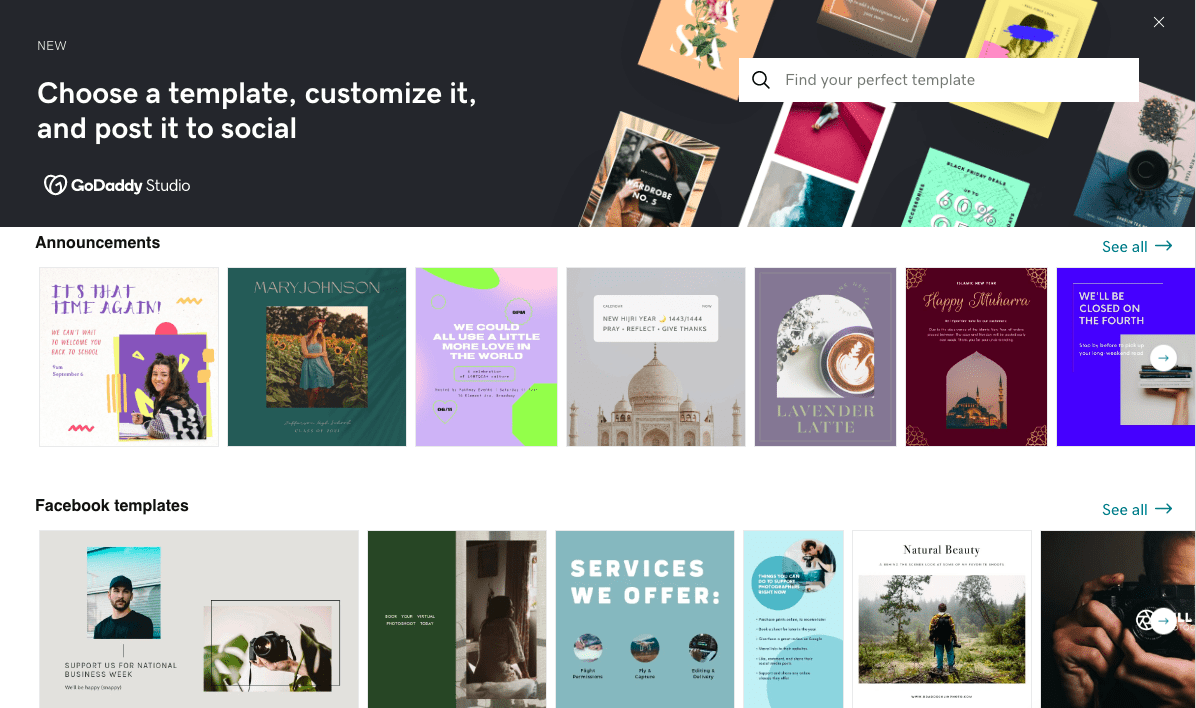
Marketing tools like GoDaddy’s content creator (GoDaddy Studio) help you manage marketing campaigns in one place
The website builder side of GoDaddy might seems pretty basic, but its website management and online marketing side are anything but.
Leading website builders such as Wix and Squarespace offer the same useful features (email marketing tools and social media dashboard), but GoDaddy’s approach is more accessible. Why? These features are more tightly integrated into GoDaddy’s platform.
GoDaddy’s Studio gives you plenty of styling power for creating social content and posts. On top of this marketing solution, GoDaddy caters to small businesses by adding business-oriented tools such as an online store, appointment scheduling, live chat, and analytics.
Which small businesses can benefit from GoDaddy + Marketing?
If you’re a business that’s looking to ramp up your online marketing, this platform can do wonders for your efforts.
More Information On GoDaddy + Marketing
Inclusions:
- Free Plan
- Free Domain with Paid Plan
- Free Hosting with Paid Plan
- Mobile App
- Free Email (1st year only)
- Contact form
Support: FAQs, Chat, Telephone
Paid Plans start at: £7.99 / month
> Get a more comprehensive view of GoDaddy website builder.
> Give GoDaddy a go today.
4. Hostinger Website Builder – The Tool For Getting Your Business Off The Ground
Hostinger Website Builder (formerly known as Zyro) is the newest player on the list, which seems serendipitous because it’s also a good fit for new entrepreneurs. We consider it one of the most affordable website builders, so we’re confident it can help you break into the online business world without breaking the bank.
Combine it with a choice of 150 professional-looking templates and a Wix-like drag-and-drop editor, and you’ve got a real winner on your hands.
The templates can be categorized into 16 different industries, including restaurant, ecommerce, portfolio, and marketing. That means there’s sure to be a template that works for your business. If there’s none, you can leverage its Wix ADI-like function to design more suitable suggestions for you.
This website builder is still finding its way in the industry. A lot of key features are lacking. For instance, functionality is limited due to the absence of an app market. But it has plenty of potential, especially since it seems like updates are routine for Hostinger.
Hostinger Website Builder Pros And Cons
Pros:
- Excellent AI tools
- Plenty of ways to get started
- Simple editor with a clean layout
- Very budget-friendly
Cons:
- No app store
- Only suitable for small websites
- Basic SEO
- Basic blog
Hostinger Small Business Tools

Hostinger gives you over ten AI tools to get you started
The reason we think it’s great for start-up businesses is its AI-powered toolset. The AI writer alone can save you time and money by coming up with copywriting ideas for different web pages.
Other notable tools include a logo maker, blog title generator, privacy policy generator, image enhancer, and more. If you’re also a little lost on where to put call-to-action buttons to engage your visitors, Hostinger Website Builder’s handy heat map tool can clue you in.
Which types of small businesses should use Hostinger?
We think it’s best for newcomers in the business. This platform has plenty of tools available to help you launch your business online.
More Information On Hostinger Website Builder
Inclusions:
- Free Domain with Paid Plan
- Free Hosting with Paid Plan
- Free Email (3-month trial)
- Contact form
- Free Plan
- Mobile App
Support: FAQs, Email, Chat
Paid Plans start at: £8.99 / month (often on sale)
> Read our complete Hostinger Website Builder review here.
> Check out Hostinger Website Builder for yourself.
5. Jimdo – The Easy Way To Create Your Website In A Jiff
Jimdo has a jumbo claim: It can help you bring your business to the Internet within three minutes. The platform is designed intuitively to help small businesses succeed online. With the magic guidance of its smart virtual wizard and flexible layouts, the whole process becomes a breeze, so you can *actually* get a good first draft in no time.
The final product is often mobile-responsive since the templates are fully designed to be as such. This ease of use makes it a good platform for small businesses looking to get their website up and running ASAP. But we don’t see it as a scalable solution, and it offers little in the way of design options and capabilities.
The number of templates is somewhat limited, and there’s no straightforward way to extend functionality since Jimdo doesn’t have a proper app marketplace. You can, however, use its Smart Apps feature to integrate a handful of external tools (e.g. a Calendly booking calendar, Instagram post, Airbnb listing, or Google Doc).
However, in our experience, what it lacks in essentials, it makes up for with excellent customer service. So if you’re just interested in a small website and aren’t very tech-savvy, this is a good pick.
Jimdo Pros And Cons
Pros:
- Easy to use
- Quick
- Excellent support
- Mobile-responsive designs
Cons:
- Limited capabilities
- Few extensions
- Basic design
Jimdo Business Tools
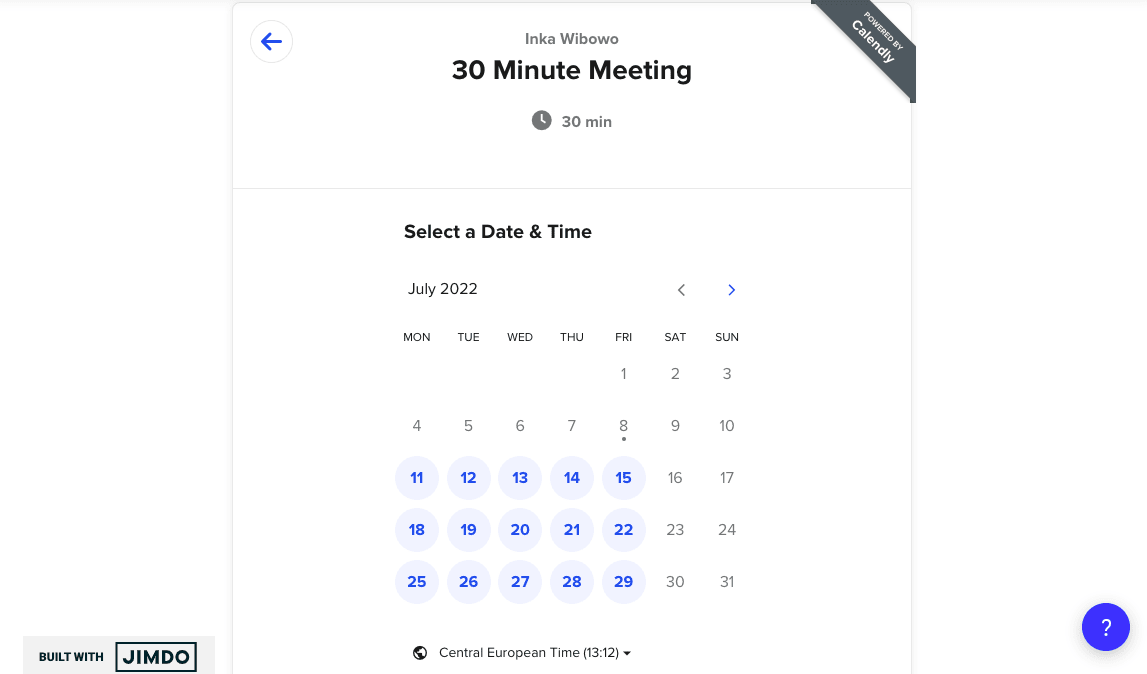
Add more power to your business website by embedding a Smart App, such as a Calendly booking form
Jimdo has good business features such as social selling, order management, newsletter signups, and appointment booking. Any of the services above can be added to your website using a widget or HTML element. All you need to do is paste the embed code and click Save.
Through Jimdo’s Smart Apps, you can take advantage of direct integrations with platforms like Airbnb or Calendly, which can be embedded on your site.
It also has a free logo maker, which is a huge plus if you want to improve your branding before going live.
Which types of small businesses should use Jimdo?
Any small business needing to establish its online presence quickly.
More Information On Jimdo
Inclusions:
- Free Plan
- Free Domain with Paid Plan (for one year)
- Free Hosting with Paid Plan
- Contact form
- Mobile App
- Free Email
Support: FAQs, Email
Paid Plans start at: £10 / month
> Read our full Jimdo review here.
> Try Jimdo today.
6. Weebly – The Most Beginner-Friendly Editor
Weebly belongs to Square’s business toolkit. When compared to its flashy older brother Squarespace or our top pick Wix, the platform might seem like an amateur actor trying to compete with the big boys.
But like Tom Holland auditioning for the role of Spider-Man, it’s hard not to be impressed. What stole the show for us is Weebly’s intuitive interface. Since small business owners don’t usually have the resources to work with expensive designers, we imagine you’d want to DIY your first venture into the world of web design.
Weebly’s easy drag-and-drop system allows you to simply plop down design elements to where you want them and then proceed to modify their properties. But along with this ease of use comes limited design flexibility.
We also find the templates, although professionally designed, sparse and seemingly outdated. The slow rollout of updates relegated our former third-place pick to the penultimate position on our list.
On the upside, we have experience using this builder ourselves for real websites and have discovered it can handle larger websites (100 + pages, for example). Therefore, as far as scalability is concerned, Weebly can deliver.
Weebly Pros and Cons
Pros:
- Intuitive drag and drop interface
- Quick set-up
- Affordable and simple pricing plans
- Fairly decent app store
Cons:
- Slow rollout of features and apps
- Limited design flexibility
- Can’t create multilingual sites easily
Weebly Small Business Tools
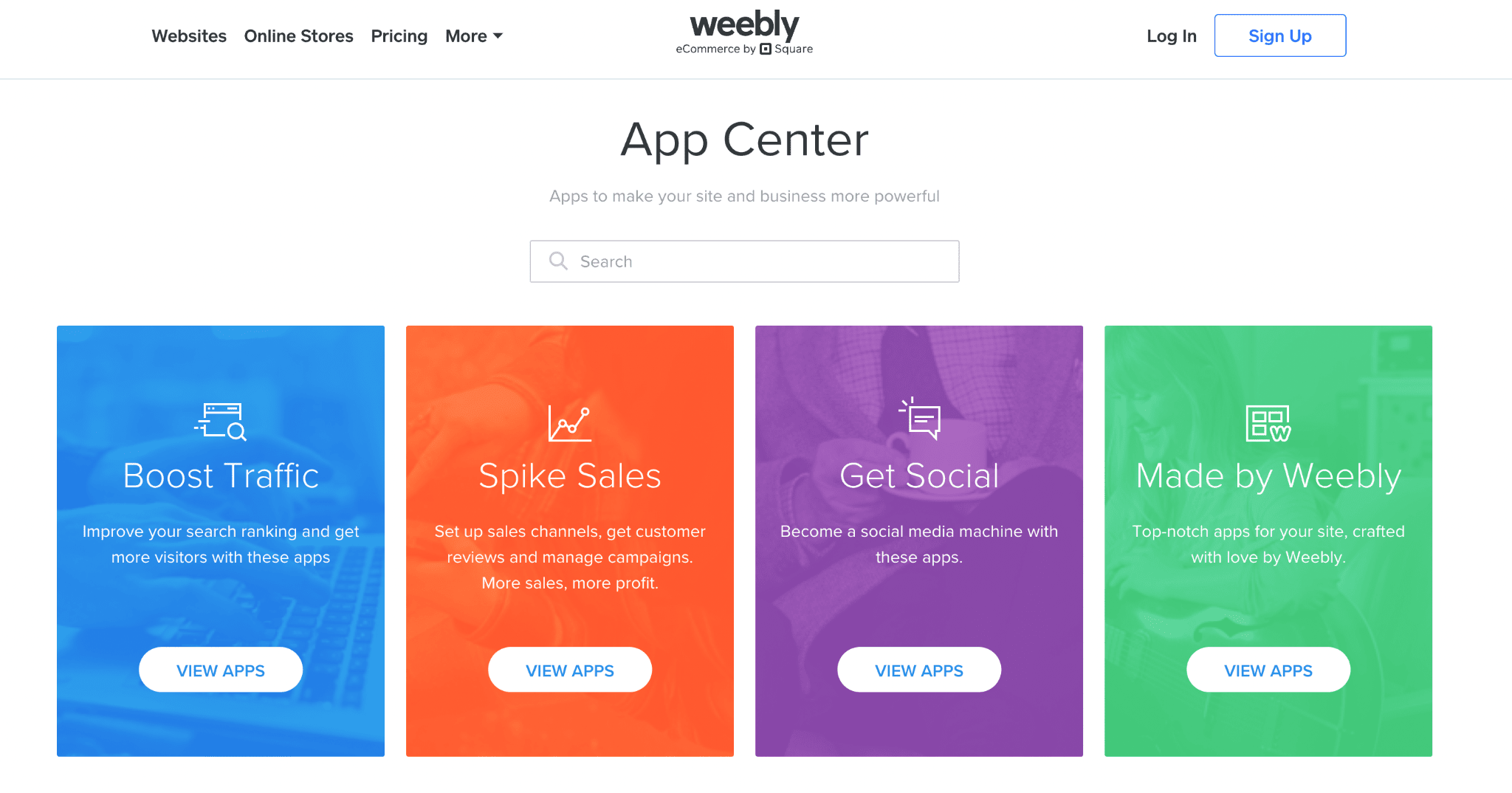
Weebly’s app center has a good selection of apps to help with sales, traffic, and networking
Weebly has a decent library of apps, including its own and third-party apps. There’s also a member and customer accounts section, which is a generous addition considering the platform’s affordable price point.
Weebly offers a lot of free bonuses. There are free templates for privacy policies and terms and conditions. It also integrates with Google Analytics at no cost.
As for ecommerce businesses, Weebly’s ability to generate sales reports, orders, conversions, etc. can prove beneficial, as these features are usually part of a more expensive package or require an additional plug-in for other platforms.
Which small businesses can benefit from Weebly?
It’s a good choice for small businesses that need to manage a simple, no-fuss website, such as local businesses.
More information on Weebly
Inclusions:
- Free Plan
- Free Domain with Paid Plan (for one year)
- Free Hosting with Paid Plan
- Mobile App
- Contact form
- Free Email
Support: FAQs, Email, Chat, Telephone
Paid Plans start at: £5 / month
> Find our up-to-date review here.
> Or learn about Weebly’s SEO tools and capabilities.
> You can also try Weebly today.
7. WordPress.com – Trusted Platform with The Highest Design Flexibility
WordPress is an industry-leading platform for creating websites. As an open-source, self-hosted content management system, it operates differently than the other website builders on our list and can be trickier to master.
On the upside, this level of complexity allows for greater customization and scalability. Aside from thousands of website templates to select from and plug-ins and add-ons to install, those with technical know-how can also access full source code. This gives them complete control over every aspect of their website.
It would likely top the list if we were talking about creating complex websites. But since we have to consider entrepreneurs without coding skills, this platform isn’t usually front of mind when choosing the best website builder for small business – especially not WordPress.org, which requires site owners to manage the site’s hosting, security, and updates.
WordPress.com was created to address that problem. It offers several different plans (including a free one), all of which include hosting, installation, and maintenance. The Business and eCommerce plans also give you access to plugins to extend the functionality of your site.
WordPress Business Tools
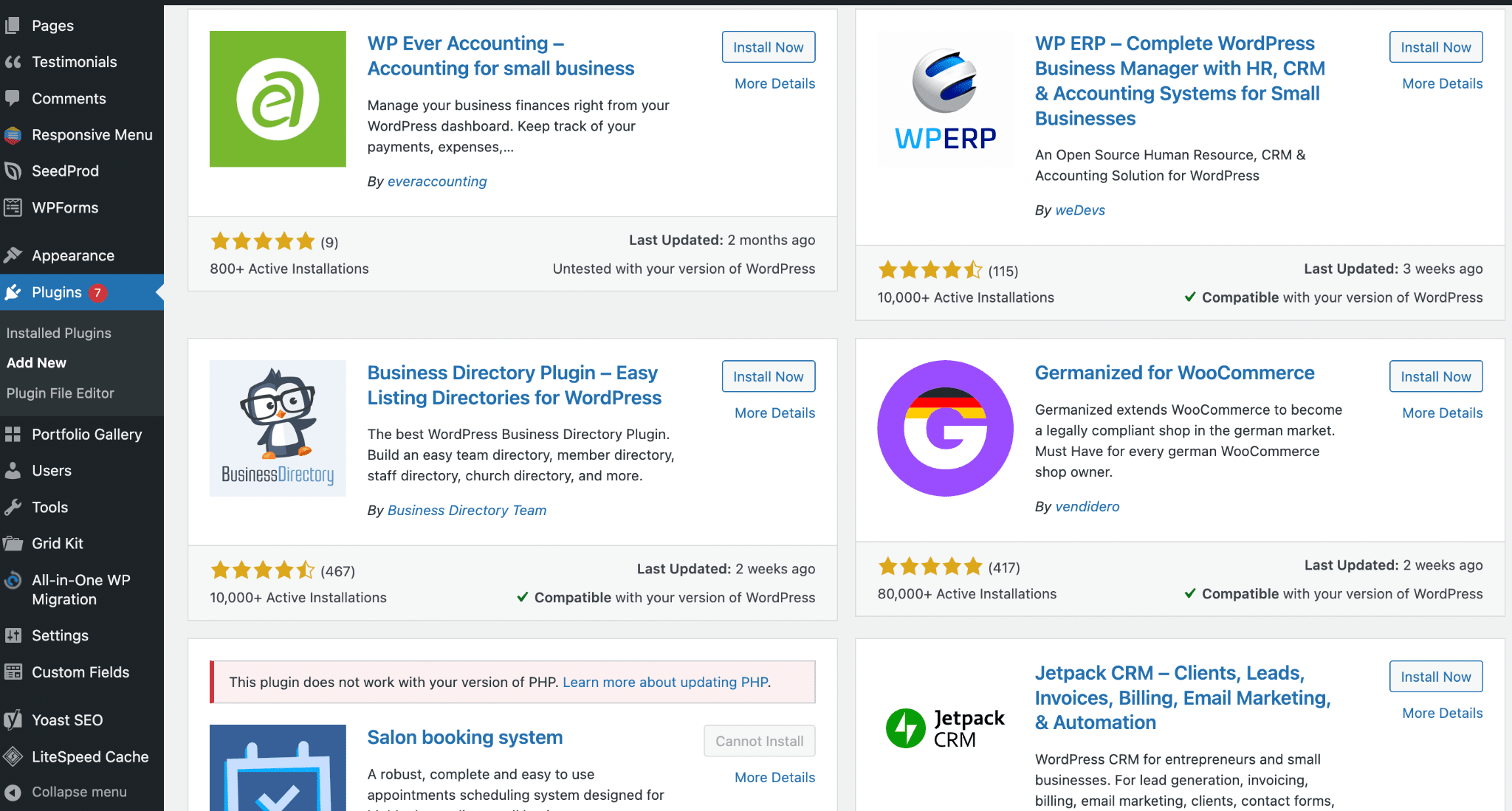
Having been in existence far longer than the others on this list, WordPress offers small business owners thousands of plugins to help enhance their site
Various WordPress plugins exist for almost every business scenario imaginable. A few examples are shopping carts, membership pages, multilingual sites, online booking systems, and forms. There are also a variety of marketing, SEO, and analytics tools.
Most famous of all, however, is probably WooCommerce, WordPress’s own ecommerce plugin (which also happens to be the world’s most popular ecommerce plugin). If you’re looking to add an online store to your small business’s website, it’s an option definitely worth exploring.
WordPress.com Pros And Cons
Pros:
- High level of customization
- Adaptability
- Large storage
- Pricing plans cater to a wide range of budgets and needs
Cons:
- Complex UI
- An extended learning curve
- Plugins only included in higher-tier plans
Which types of small businesses should use WordPress.com?
Scalable businesses and fast-growing companies that need more control than conventional site builders can give them. If you have big plans for your website, WordPress.com is the option to check out.
More Information On WordPress
Inclusions:
- Free Plan
- Free Domain with Paid Plan (for one year)
- Free Hosting
- Mobile App
- Free Email (for 3 months)
- Contact form
Support: FAQs, Email, Chat
Paid Plans start at: £3/ month
> Check out our comprehensive WordPress.com review.
> Find out how it differs from WordPress.org.
> Or simply visit WordPress.com to test it out.
Why Does My Small Business Need a Website?
If you are still unsure about whether your business needs one of the best website builders for small businesses, let us tell you the benefits of getting one.
Your website acts as your 24/7 business card, brochure, and salesroom all at once. Aside from building your customer base by word-of-mouth, having a unique website helps position your business by:
- Showcasing what your brand is all about. Some 99% of customers search the internet for local businesses–a very favorable number for establishments such as restaurants, bookshops, and so on. Use your website to inform prospects about your products and services.
- Boosting customer reach and visibility. Organic searches from interested prospects account for 53% of all website traffic. With a great UX design and optimized web pages, your website can help you attract more customers and break into new markets.
- Promoting your products and services. Creating marketing campaigns or publishing content on your website can increase consumer awareness of your products and services. In fact, a quarter of small businesses create their website primarily for this purpose.
- Engaging with customers and clients. Almost 29% of SMBs launch a website to reach out to their customers. On a daily average, 21% of consumers go online to find information about local businesses. They’re likely to get in touch with you straight away if your website includes your telephone number, email address, social media accounts, and business location.
- Improving your brand’s reputation and professional credibility. Nearly 77% of consumers always read online reviews before trusting local brands. That’s why having a professional-looking website flooded with positive reviews can increase a prospect’s confidence that your business is safe and trustworthy.
- Selling your products online (for e-commerce). An e-commerce website can increase sales by up to 35% when customers have a seamless shopping experience. With a minimal startup cost, a website can help boost your sales and scale your business in the long run.
Small Businesses That Can Benefit From Having A Website
Local establishments
Businesses like hotels, restaurants, and cafés can scale their sales by creating a website where clients and customers can place reservations or orders online. Through this, they can spread the word about their brand as far and wide as possible.
Retailers/ecommerce
Online sales are expected to grow by 50% over the next four years. Small businesses (e.g., groceries, clothing stores, gift shops) can use this opportunity to show off their brand, market their products 24/7, and keep up with their competition. If you belong to this category, we have a more relevant roundup and a complete guide to setting up an online store.
Professional service providers
Professionals from various industries, such as healthcare providers, accountants, counselors, and lawyers can use an online booking website. It can help them attract new clients while facilitating customer appointments online. (If this is you, check out our guide on the best website builder for a service business.)
Agencies and niche businesses
Marketing agencies, travel agencies, and other niche markets can use their websites to pique their target clients’ interests. For instance, valuable and engaging content can boost their traffic and online presence, resulting in more closed deals or subscriptions.
Freelance creatives
For freelance artists, musicians, writers, photographers, and web designers, a portfolio website can help them establish their expertise through previous works and client testimonials. Prospects can simply browse their websites and contact them directly from there.
If any of these describe your business, there are no two ways about it: You need a website.
Dealing With Small Business Website Legal Issues
Now, we’re not lawyers, but in general, your small business website needs to do three things (Tip: You may want to consult a lawyer to get into the nitty-gritty.):
- Register your business: The simplest form of business is the sole proprietorship, also known as a sole trader. You need to be 18 years of age to do it.
- Provide a Privacy Policy: The style might look different depending on where you are based in the world. But the content is generally the same: what information you gather and how you share it; how users can see the information they gave you and change it; your policy’s date, description, and updates. Some platforms, such as Hostinger Website Builder and Weebly, can generate a privacy policy for you.
- Give clear Terms and Conditions: This is where users can see what they must do and mustn’t do. It will generally detail: important keywords, user rights and responsibilities, use of the website, and more if you are creating an online store. While it may not be required by law, it can limit your liability should a website user take you to court. Hostinger and Weebly have a terms and conditions template you can use. Wix’s Legal Texts by Trusted Shops and WordPress’ Legal Pages are also available for you to generate official documents.
Short on Time? Here’s A Quick Recap of The Best Website Builders for Small Business
Each of the website builders on the list is capable of building a website for your small business without programming knowledge. But we picked Wix because we see it as the most comprehensive solution. If you’re not convinced it’s the best solution for you, take a look at the other six options and see which resonates most with your business needs:
- Wix: The One-Stop-Shop for Creating Small Business Websites
- Squarespace: The Brand Strengthening Champion
- GoDaddy: A Powerful Marketing Partner
- Hostinger Website Builder (Zyro): The Tool For Getting Your Business Off The Ground
- Jimdo: The Easy Way To Create Your Website In A Jiff
- Weebly: The Best Beginner-Friendly Editor
- WordPress.com: Trusted Platform with The Highest Design Flexibility
You can always try these platforms for free. Squarespace and Hostinger, on the other hand, will require you to pick a plan before publishing your website. It won’t hurt to give them a try to see if they fit your business and how easy it will be to work with them. If you still can’t make a decision, feel free to take this test.
Once you’ve selected which of the 7 most popular website builders is appropriate for your business, the next step is to get your hands busy with designing it. And since you’ve trusted us to help you make this important choice, we want to give you a gift that can get the wheels turning: A handy guide to creating a small business website.
Best Website Builder For Small Businesses FAQs
All the platforms listed above (except for Hostinger and Squarespace) have a free version to let you create and design your website after signing up.
However, you would have to upgrade to use your own domain name, remove ads, and use a business email address – in short, to keep your website (and business) looking professional.
It will be a long road, as there are two main ways to get there: organic and paid traffic.
Through paid traffic: If you have an extra budget for advertising, you can invest in Google AdWords, Facebook Ads, or other marketing services to target your ideal audience. The more they engage with your campaigns, the higher the traffic your website receives. This can be a very costly endeavor, depending on how competitive your industry is.
Through organic traffic: By publishing relevant and valuable content, incorporating search engine optimization strategies, and sharing web content on other social media platforms, you can improve your online visibility — thus, increasing your web visitors. SEO is a big topic worth getting into, so you might want to jot down a few notes from our best website builder for SEO guide.
Hiring a freelance web designer or an agency for a basic project ranges from $800 to $5,000. Meanwhile, a premium, custom-coded website may cost from $15,000 to over a hundred thousand dollars, exclusive of site maintenance costs.
Read more about the costs to create a website here.
Approximately, a simple website with 5 web pages or less can take anywhere from a few minutes to weeks. More complex designs, such as a full e-commerce website, may require more time. Powerful and page-rich websites may even take up to 6 months.
Some things you should bear in mind when building your small business website are:
- your own domain name (e.g. www.your-biz.com)
- email accounts (e.g. [email protected])
- professional-looking web designs
- SEO features (for better ranking with search engines)
- mobile-friendly templates
- contact forms
- email marketing options
- social media integration
- technical support
- option to add an online store (if you plan to also sell online)
Our overview of the main website building solutions should give you a good idea of where to start.
We keep our content up to date
12 Feb 2023: Zyro is now Hostinger Website Builder
27 Dec 2022: Small corrections and other updates
27 Sep 2022: Zyro video review added
11 Aug 2022: Full update, new website builders added
THE BEHIND THE SCENES OF THIS BLOG
This article has been written and researched following a precise methodology.
Our methodology








